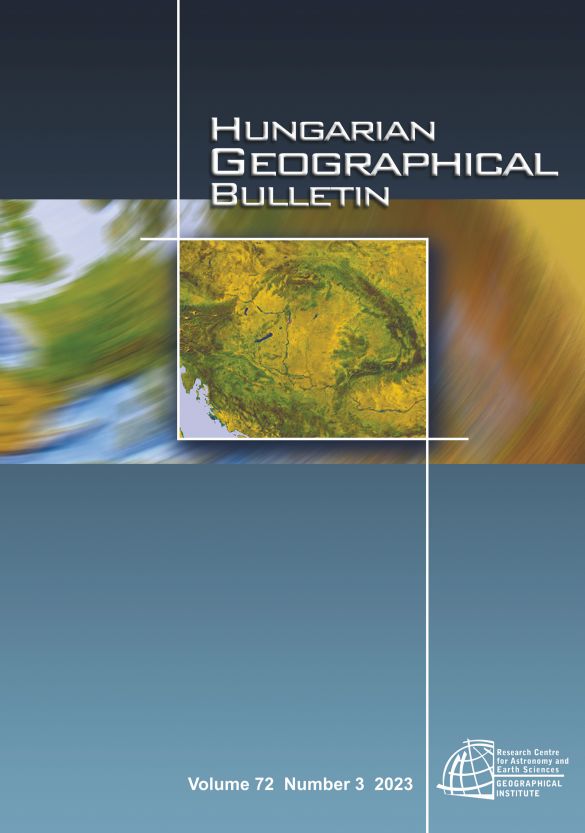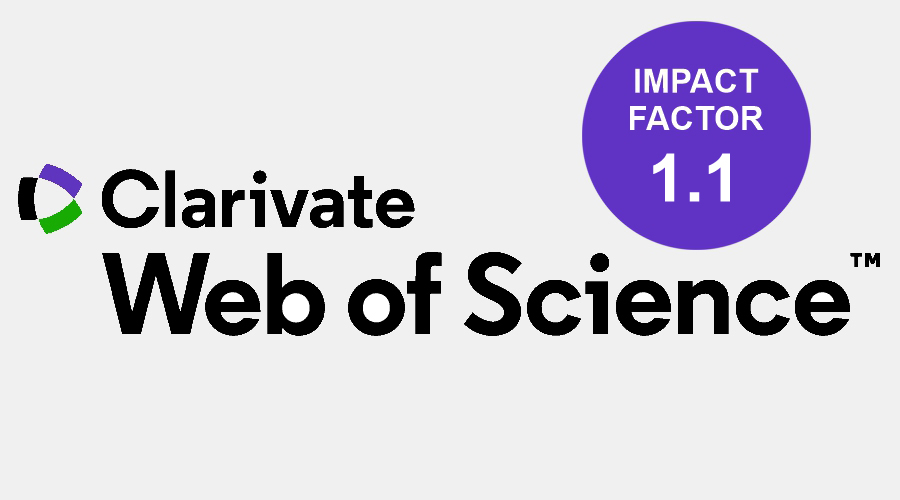Exploring firm performance in Central and Eastern European regions: a foundational approach
Abstract
Economic development in post-transition countries is dominated by the performance of capital cities, although second-tier cities are also important drivers of development. However, peripheral regions struggle with problems of adaptation and response, often leading to brain drain and economic decline. Industrial strategies highlight those tradable sectors of the economy that favour leading edge KIBS firms and advanced manufacturing, while neglecting the residentiary economy that is more sheltered from competition and provides jobs in local production and services sectors. Our research is inspired by the burgeoning literature of the ‘foundational economy’ approach to economic development, focusing on mundane economic activities providing essential goods and services, and we investigate the differences of economic performance across the NUTS3 regions in selected CEE countries. We study regionally aggregated, firm-level financial and employment data including sectoral classification of the companies with 10+ employees. Our position is that a well-functioning foundational economy is necessary for the whole local economy to work efficiently in the long run. Moreover, increasing productivity in the foundational economy should lead to more regionally balanced growth than an exclusive focus on the ‘frontier firms’ that are highly concentrated spatially as the regional productivity gap in the case of certain foundational activities is not necessarily large.
References
Aiginger, K. 2015. Industrial policy for a sustainable growth path. In New Perspectives on Industrial Policy for a Modern Britain. Eds.: Bailey, D., Cowling, K. and Tomlinson, P., Oxford, Oxford Academic Press, 1-33. https://doi.org/10.1093/acprof:oso/9780198706205.003.0019 ; https://www.oecd.org/economy/Industrial-Policy-for-a-sustainable-growth-path.pdf
Barbera, F., Negri, N. and Salento, A. 2018. From individual choice to collective voice. Foundational economy, local commons and citizenship. In Rassegna Italiana di Sociologia. Rivista trimestrale fondata da Camillo Pellizzi 2/2018. 371-398.
Bärnthaler, R., Novy, A. and Plank, L. 2021. The foundational economy as a cornerstone for a social-ecological transformation. Sustainability 13. (18): 10460. https://doi.org/10.3390/su131810460
Bärnthaler, R. and Gough, I. 2023. Provisioning for sufficiency: envisaging production corridors. Sustainability: Science, Practice and Policy 19. (1): 2218690. https://doi.org/10.1080/15487733.2023.2218690
Bentham, J., Bowman, A., Cuesta, M. et al. 2013. Manifesto for the Foundational Economy. Working paper No. 131. Manchester, Centre for Research on Socio-Cultural Change.
Berry, C. 2018. Industrial policy: impossible, but indispensable. In New Thinking for the British Economy. Ed.: Macfarlane, L., London, UK, openDemocracy, 77-91.
Bertus, Z. and Kovács, Z. 2022. The geography of electoral volatility in Hungary: A core-periphery perspective. Hungarian Geographical Bulletin 71. (1): 67-81. https://doi.org/10.15201/hungeobull.71.1.5
Birch, K. and Cumbers, A. 2007. Public sector spending and the Scottish economy: Crowding out or adding value? Scottish Affairs 58. 36-56. https://doi.org/10.3366/scot.2007.0003
Bodnár, G., Kovács, P. and Egri, Z. 2022. Elements of endogenous development in the regions ofVisegrad countries. Deturope 14. (1): 29-49. https://doi.org/10.32725/det.2022.002
Bosák, V., Slach, O., Paszová, L., Hýllová, L., Mykhnenko, V., Krtička, L. and Nováček, A. 2023. Coping with peripheralization in small cities. What is the role of human agency? European Planning Studies Online publication, 1-21. https://doi.org/10.1080/09654313.2023.2219274
Bowman, A., Ertürk, I., Froud, J., Johal, S. and Law, J. 2014. The End of the Experiment? From Competition to the Foundational Economy. Manchester, UK, Manchester University Press. https://doi.org/10.7765/9781847798930
Bowman, A., Froud, J., Sukhdev, J., Leaver, A. and Williams, K. 2015. Reframing industrial policy. In New Perspectives on Industrial Policy for a Modern Britain. Eds.: Bailey, D., Cowling, K. and Tomlinson, P., Oxford, Oxford Academic Press, 60-78. https://doi.org/10.1093/acprof:oso/9780198706205.003.0004
Boyle, M., Jones, A., Sykes, O. and Wray, I. 2019. 'National' Spatial Strategies in an Age of Inequality Insights from the United Kingdom, Ireland and France. Liverpool, University of Liverpool, Heseltine Institute for Public Policy, Practice and Place.
Braudel, F. 1981. The Structures of Everyday Life: Civilization and Capitalism. New York, Harper & Row.
Calafati, L., Froud, J., Haslam, C., Johal, S. and Williams, K. 2021. Diversity in leading and laggard regions: Living standards, residual income and regional policy. Cambridge Journal of Regions, Economy and Society 14. (1): 117-139. https://doi.org/10.1093/cjres/rsaa027
Coote, A. 2020. Universal Basic Services and the Foundational Economy. Foundational Economy Collective Working Paper 7. Cambridge, New Economics Foundation. https://doi.org/10.7765/9781526158727
Coote, A. and Percy, A. 2020. The Case for Universal Basic Services. Cambridge, UK, Polity Press.
Crisp, R. 2022. Levelling up through private sector 'wealth creation': Some thoughts on the neglect of alternative approaches. People, Place and Policy 16. (2): 157-162. https://doi.org/10.3351/ppp.2022.2887293269
Engelen, E., Froud, J., Johal, S., Salento, A. and Williams, K. 2017. The grounded city: From competitivity to the foundational economy. Cambridge Journal of Regions, Economy and Society 10. (3): 407-423. https://doi.org/10.1093/cjres/rsx016
Essletzbichler, J. 2022. Engaging with precarious urban futures: From entrepreneurial to grounded cities. European Urban and Regional Studies 29. (4): 419-439. https://doi.org/10.1177/09697764221087646
Evenhuis, E., Lee, N., Martin, R. and Tyler, P. 2021. Rethinking the political economy of place: Challenges of productivity and inclusion. Cambridge Journal of Regions, Economy and Society 14. (1): 3-24. https://doi.org/10.1093/cjres/rsaa043
Fabula, Sz., Skovgaard Nielsen, R., Barberis, E., Boros, L., Hedegaard Winther, A. and Kovács, Z. 2021. Diversity and local business structure in European urban contexts. Hungarian Geographical Bulletin 70. (1): 65-80. https://doi.org/10.15201/hungeobull.70.1.5
FE Collective 2018. The Foundational Economy Collective, Froud, J., Johal, S., Moran, M., Salento,A. and Williams, K. Foundational Economy: The Infrastructure of Everyday Life. PMO Management and Organisation Studies. Manchester, Manchester University Press.
FE Collective 2019. SIC Code Description. NACE Code and Description. Available at https://foundationaleconomycom. files.wordpress.com/2019/01/copy-offe-listing-sic-2007-matched-to-nace-rev2.xlsx
FE Collective 2020. The Foundational Approach. Manchester, UK, The Foundational Economy Collective.
Fioramonti, L., Coscieme, L., Costanza, R. et al. 2022. Well-being economy: An effective paradigm to mainstream post-growth policies? Ecological Economics 192. (5) https://doi.org/10.1016/j.ecolecon.2021.107261
Forth, J. and Rincon Aznar, A. 2018. Productivity in the UK's Low-wage Industries. York, UK, Joseph Rowntree Foundation.
Froud, J. and Williams, K. 2019. Adding value. In Everyday Socialism. How to Rebuild Britain. Ed.: Reeves, R. London, Fabian Society, 23-32.
Froud, J., Haslam, C., Johal, S. et al. 2020. (How) does productivity matter in the foundational economy? Local Economy 35. (4): 316-336. https://doi.org/10.1177/0269094220956952
Gal, P.N. 2013. Measuring Total Factor Productivity at the Firm Level Using OECD-ORBIS. OECD ECO/WP No. 1049. Paris, OECD.
Gál, Z. and Lux, G. 2022. FDI-based regional development in Central and Eastern Europe: A review and an agenda. Tér és Társadalom 36. (3): 68-98. https://doi.org/10.17649/TET.36.3.3439
Galgóczi, B., Drahokoupil, J., Bernaciak, M. and Pavlínek, P. (eds.) 2015. Foreign Investment in Eastern and Southern Europe after 2008. Still a Lever of Growth? Omaha, University of Nebraska.
Gibson-Graham, J.K. 2008. Diverse economies: Performative practices for 'other worlds'. Progress in Human Geography 32. (5): 613-632. https://doi.org/10.1177/0309132508090821
Gibson-Graham, J.K. and Dombroski, K. (ed.) 2020. The Handbook of Diverse Economies. Cheltenham, Edward Elgar Publishing. https://doi.org/10.4337/9781788119962
Gough, I. 2020. The case for universal basic services. LSE Public Policy Review 1. (2): 1-9. https://doi.org/10.31389/lseppr.12
Gough, I. 2021. Two Scenarios for Sustainable Welfare: New ideas for an Eco-social Contract. Working Paper 2021.12. Brussels, ETUI. https://doi.org/10.2139/ssrn.3969042
Győrffy, D. 2022. The middle-income trap in Central and Eastern Europe in the 2010s: Institutions and divergent growth models. Comparative European Politics 20. 90-113. https://doi.org/10.1057/s41295-021-00264-3
Hansen, T. 2022. The foundational economy and regional development. Regional Studies 56. (6): 1033-1042. https://doi.org/10.1080/00343404.2021.1939860
IPCC 2022. Climate Change 2022: Mitigation of Climate Change. Contribution of Working Group III to the Sixth Assessment Report of the Intergovernmental Panel on Climate Change. Cambridge, Cambridge University Press.
Iammarino, S., Rodríguez-Pose, A. and Storper, M. 2019. Regional inequality in Europe: Evidence, theory and policy implications. Journal of Economic Geography 19. (2): 273-298. https://doi.org/10.1093/jeg/lby021
Leaver, A. and Williams, K. 2014. After the 30-year experiment: The future of the foundational economy. Juncture 21. (3): 215-221. https://doi.org/10.1111/j.2050-5876.2014.00808.x
MacKinnon, D., Kempton, L., O'Brien, P., Ormerod, E., Pike, A. and Tomaney, J. 2022. Reframing urban and regional "development" for "left behind" places. Cambridge Journal of Regions, Economy and Society 15. (1): 39-56. https://doi.org/10.1093/cjres/rsab034
Marques, P., Morgan, K. and Richardson, R. 2018. Social innovation in question: The theoretical and practical implications of a contested concept. Environment and Planning C: Politics and Space 36. (3): 496-512. https://doi.org/10.1177/2399654417717986
Martynovich, M., Hansen, T. and Lundquist, K-J. 2023. Can foundational economy save regions in crisis? Journal of Economic Geography 23. (3): 577-599. https://doi.org/10.1093/jeg/lbac027
Mátyás, L. (ed.) 2022. Emerging European Economies after the Pandemic: Stuck in the Middle-Income Trap? Cham, Springer. https://doi.org/10.1007/978-3-030-93963-2
Molnár, E., Kozma, G., Mészáros, M. and Kiss, É. 2020. Upgrading and the geography of the Hungarian automotive industry in the context of the fourth industrial revolution. Hungarian Geographical Bulletin 69. (2): 137-155. https://doi.org/10.15201/hungeobull.69.2.4
Morgan, K. 2021. After the pandemic: experimental governance and the foundational economy. Symphonia: Emerging Issues in Management 2021. (1): 50-55. https://doi.org/10.4468/2021.1.05morgan
Nagy, B., Lengyel, I. and Udvari, B. 2020. Reindustrialization patterns in the post-socialist EU members: A comparative study between 2000 and 2017. European Journal of Comparative Economics 17. (2): 253-275.
Nagy, Cs., Molnár, E. and Kiss, É. 2020. Industry 4.0 in a dualistic manufacturing sector: Qualitative experiences from enterprises and their environment, Eastern Hungary. Hungarian Geographical Bulletin 69. (2): 157-174. https://doi.org/10.15201/hungeobull.69.2.5
Nölke, A. and Vliegenthart, A. 2009. Enlarging the varieties of capitalism: The emergence of dependent market economies in East Central Europe. World Politics 61. 670-702. https://doi.org/10.1017/S0043887109990098
Novy, A. 2022. The political trilemma of contemporary social-ecological transformation: Lessons from Karl Polanyi's The Great Transformation. Globalizations 19. 1: 59-80. https://doi.org/10.1080/14747731.2020.1850073
Nygaard, B. and Hansen, T. 2020. Local development through the foundational economy? Priority-setting in Danish municipalities. Local Economy 35. (8): 768-786. https://doi.org/10.1177/02690942211010380
Polanyi, K. 1944. The Great Transformation: The Political and Economic Origins of Our Time. Boston, MA, Beacon Press.
Reeves, R. 2018. The Everyday Economy. Leeds, UK, Labour. Available at rachelreevesmp.co.uk/wp-content/uploads/sites/96/2020/09/374425087-Rachel-Reeves-The-Everyday-Economy-1.pdf
Rodríguez-Pose, A. 2018. The revenge of the places that don't matter (and what to do about it). Cambridge Journal of Regions, Economy and Society 11. (1): 189-209. https://doi.org/10.1093/cjres/rsx024
Russell, B., Beel, D., Rees Jones, I. and Jones, M. 2022. Placing the foundational economy: An emerging discourse for post-neoliberal economic development. Environment and Planning A: Economy and Space 54. (6): 1069-1085. https://doi.org/10.1177/0308518X221098745
Scott, J.W. 2021. Post-millennial Visegrad Four geopolitics: Illiberalism and positionality within the EU. Deturope 13. (2): 13-33. https://doi.org/10.32725/det.2021.011
Vigvári, A. 2023. A kaláka tényleg örök? Önerős lakásépítés és a háztartási erőforrások szerepe a zártkerti lakhatás megteremtésében (Is the 'kaláka' really eternal? Self building and the role of households in the creation of housing in allotment gardens). Szociológiai Szemle 33. (1): 94-116. https://doi.org/10.51624/SzocSzemle.2023.1.6
Weresa, M.A. 2017. Innovation, human capital and competitiveness in Central and Eastern Europe with regard to the challenges of a digital economy. In Condemned to be Left Behind? Can Central and Eastern Europe Emerge from its Low-wage Model? Eds.: Galgóczi, B. and Drahokoupil, J., Brussels, European Trade Union Institute, 81-109.
Wigger, A. 2023. The new EU industrial policy and deepening structural asymmetries: Smart specialisation not so smart. Journal of Common Market Studies 61. (1): 20-37. https://doi.org/10.1111/jcms.13366
Wilkinson, R. and Pickett, K. 2022. From inequality to sustainability. EARTH4ALL: Deep-Dive Paper 01. 1-14.
Copyright (c) 2023 Ildikó Egyed, Zsuzsanna Zsibók

This work is licensed under a Creative Commons Attribution-NonCommercial-NoDerivatives 4.0 International License.






